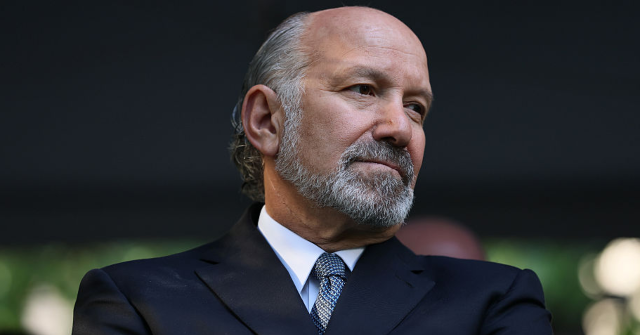Commerce Secretary Howard Lutnick dismissed complaints by Korean companies about their workers getting caught at jobs in the United States without work permits.
“I called up the Koreans, I said, ‘Oh, give me a break,’” Lutnick told Axios, adding:
Get the right visa and if you’re having problems getting the right visa, call me. I’ll call [Homeland Security Secretary] Kristi Noem. We’ll help you get the right visa, but don’t do it the wrong way.
The dismissive response comes amid ample evidence that Korean companies have been smuggling ordinary construction workers into the United States on tourist visas. The law requires that foreign companies hire Americans and get L-1 visas for specialized trainers and equipment installers. There is no cap on the number of L-1 visas, so each has to be approved by embassy officials.
“Donald Trump requires you to do it correctly. You want to immigrate, you want to bring workers here, go through the right process,” Lutnik declared to Axios. “You can’t skirt the rules anymore. That is over.”
The evidence of visa evasion is so great that even the pro-migration New York Times acknowledged the problem in a September 12 article:
The Times obtained internal Immigration and Customs Enforcement arrest records for 11 of the detained workers. Six entered the country with B1 or B1/B2 visas, which are issued for [tourists trips or] business trips of up to six months.
…
Robert Marton, an immigration lawyer with auto manufacturer clients other than Hyundai, said he had relied on B1 visas more in recent years as other programs for bringing in foreign workers had become more competitive.
Companies routinely bring in employees from elsewhere with H-1B visas, which allow someone to stay for several years. But those are capped in number, expensive to apply for and in high demand… “I think lawyers like us are looking at workarounds and getting people in quickly.”
More than 45,000 B-1/B-2 visas have been issued to Koreans in the last five years. Each visa is valid for 10 years.
A huge number of B-1B/B-2 visas and L-1 visas have been given to other countries, especially to Indians who are smuggled into jobs throughout the U.S. tech, trucking, and retail sectors. This inflow of wage-cutting airport migrants has been almost entirely ignored by the establishment media.
Labor smuggling is profitable for foreign companies and for some local American companies — but is bad for displaced Americans and their communities. It is also bad for U.S. productivity and innovation because it curbs the development of the U.S. professional sector through a range of industries.
Korean managers and employers also acknowledge their B-1/B-2 visa cheating.
Hyundai Chief Executive Officer José Muñoz told Bloomberg: “This is going to give us minimum two to three months delay, because now all these people want to get back,” he said. “Then you need to see how can you fill those positions. And for the most part, those people are not in the US” [emphasis added].
The same message was delivered by a returning Korean employee who told reporters that some — not most or all — of the repatriated Korean workers will be needed to complete the factory. “There will be some people who need to go there,” he said [emphasis added]. Many Koreans work much longer hours than Americans, making the labor smuggling a profitable choice for employers.
Labor smuggling via tourist visas “was a normal practice” and is “deeply rooted in business operations,” a source from Korea’s battery industry told the AFP News service. “But this may have to change from now on,” the source said.
The AFP article added:
Last week’s raid has left business leaders with “a sense of betrayal and anxiety,” a senior executive from the semiconductors industry told AFP. “Most of the companies follow similar practices so this could happen to any of them,” he said on condition of anonymity.
“Yes, it’s one of those things that has always been technically illegal but virtually never enforced; at least until this admin,” sniffed Aaron Reichlin-Melnick, a pro-migration zealot at the American Immigration Council. The Koreans were likely “doing some management of the construction… [but] definitely not taking an American job,” said the immigration lawyer.
Korean companies in the United States have also hired illegals via Korean-run staffing agencies, and they smuggle in Mexicans for blue-collar jobs by getting them TN visas reserved for white-collar workers.
Korean officials have long recognized their companies’ labor smuggling operations and are asking Congress to provide their companies with 15,000 work-permit visas each year. The AFP reported:
South Korea is pushing for the “Partner with Korea Act” in Washington, which would create a quota of 15,000 visas for skilled [Korean] professionals. “Unfortunately, the number of sponsoring lawmakers has decreased compared with when the bill was first introduced a decade ago,” Kim said, adding it reflected growing anti-immigration sentiment.
“The two countries are looking at establishing a working group to consider a new type of visa for Koreans, according to South Korea’s foreign minister, who visited Washington this week,” Reuters reported on September 12.
Read the full article here
